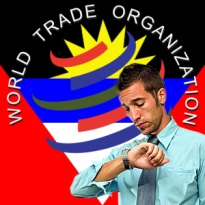 Representatives of the nation of Antigua & Barbuda have expressed their disappointment with the World Trade Organization’s delay in authorizing Antigua’s imposition of trade sanctions on the United States. Antigua has won multiple WTO rulings in its fight with the US, which the WTO determined had unfairly prevented Antigua-based online gambling companies from accessing the US market. Under the terms of a 2007 WTO ruling, Antigua was allowed to impose $21m in annual sanctions until the US brought itself into compliance. Antigua had held off imposing those sanctions in the hopes that the US would be willing to work out a mutually agreeable settlement. But with the US showing little sign of budging from its protectionist stance, Antigua decided enough was enough, announcing earlier this month that it would inform the WTO on Dec. 17 as to the specific sanctions Antigua intended to impose.
Representatives of the nation of Antigua & Barbuda have expressed their disappointment with the World Trade Organization’s delay in authorizing Antigua’s imposition of trade sanctions on the United States. Antigua has won multiple WTO rulings in its fight with the US, which the WTO determined had unfairly prevented Antigua-based online gambling companies from accessing the US market. Under the terms of a 2007 WTO ruling, Antigua was allowed to impose $21m in annual sanctions until the US brought itself into compliance. Antigua had held off imposing those sanctions in the hopes that the US would be willing to work out a mutually agreeable settlement. But with the US showing little sign of budging from its protectionist stance, Antigua decided enough was enough, announcing earlier this month that it would inform the WTO on Dec. 17 as to the specific sanctions Antigua intended to impose.
So it was that Carl Roberts, Antigua’s High Commissioner to London, traveled to Geneva, Switzerland to detail Antigua’s plans to the WTO Secretariat. But Roberts’ request to have the WTO Dispute Settlement Body (DSB) include Antigua on Monday’s agenda was blocked after the US protested that the request was “untimely” and the WTO agreed. Roberts told Caribbean360.com that the WTO’s decision was all the more galling since Antigua’s request was presented well in advance of “the completion and dissemination” of the agenda.
Roberts said the WTO should have recognized that Antigua is “a small, developing country, under particular economic stress in these difficult times. We haven’t the resources to maintain a mission here in Geneva … It is very unfortunate that we were, under all circumstances, denied the ability to present our suspensions request to this body today.” Regardless, Roberts insisted that his group would return in January, presuming the US Trade Representative doesn’t suddenly remember he has an ‘untimely’ dentist appointment that day.
A frustrated Roberts noted that the US intransigence on this issue had devastated an industry that once employed nearly 5% of Antigua’s population, but had since “shrunk to virtually nothing. A number of our citizens have been criminally prosecuted, and a number are still under the specter of arrest, prosecution and incarceration by American authorities, for ostensibly violating the very laws ruled in violation of US obligations under the [General Agreement on Trade in Services] in our case.”
(Speaking of which, last week saw the US District Court for the District of Columbia authorize the civil forfeiture of just under $7m in connection with the operations of Antigua-based World Wide Tele-Sports (WWTS) in a case that dates back to 2003. The principal defendant in that case, William Paul Scott, pled guilty on Sept. 25 to violations of the Wire Act and money laundering, for which he faces up to 62 years in prison. Scott is scheduled to be sentenced on Jan. 7, 2013.)
Frankly, we find it inexplicable that the WTO would indulge the USTR’s petty stalling tactics on a matter in which the US has long since been determined to be in the wrong. It’s even more irresponsible given Roberts’ assertion that USTR has made “no sincere effort to develop and prosecute a comprehensive solution that would end our dispute.” If the WTO truly represents all nations – and not just those that print the world’s (for the moment) reserve currency – then it will fast-track authorization of Antigua’s right to justice and equal treatment under the law.